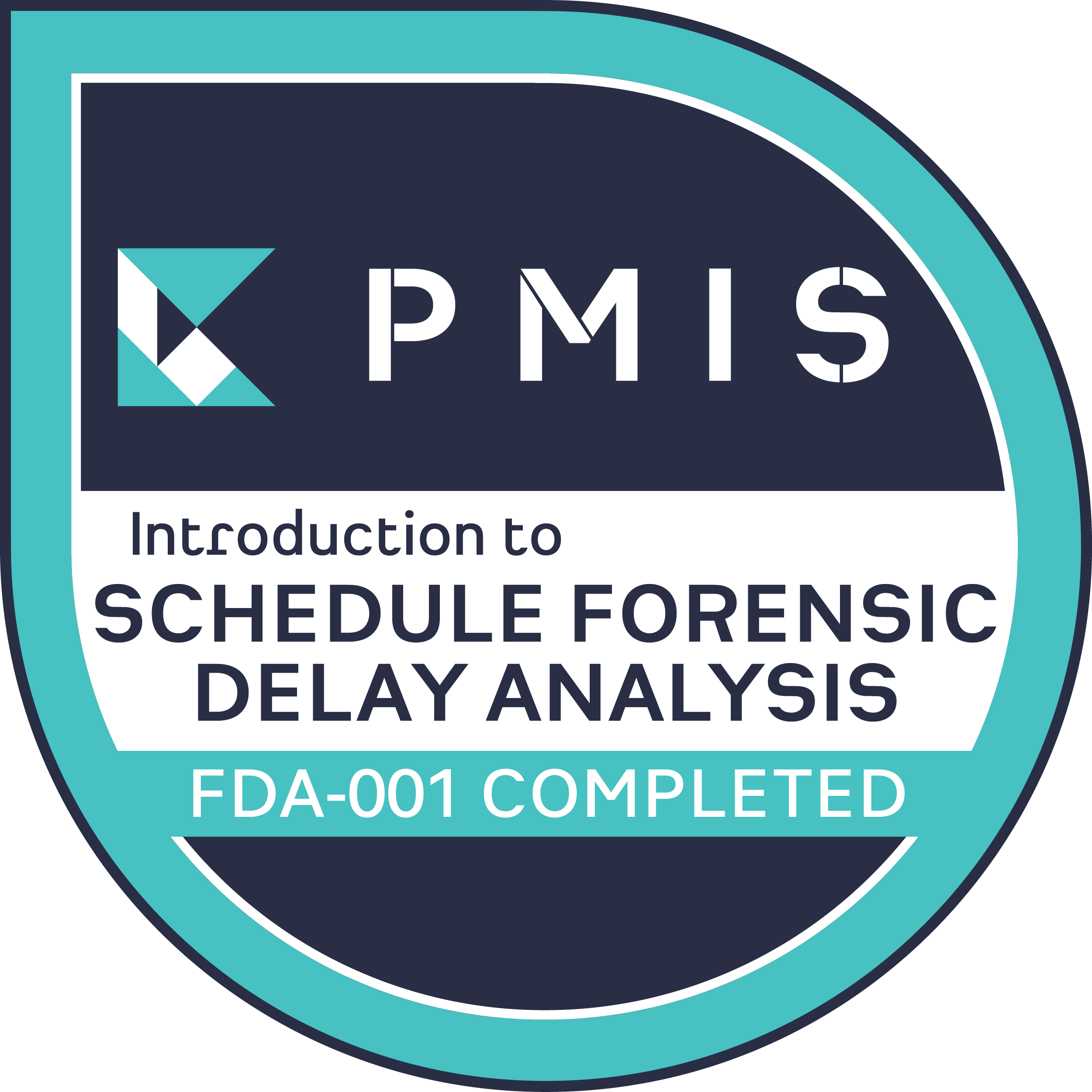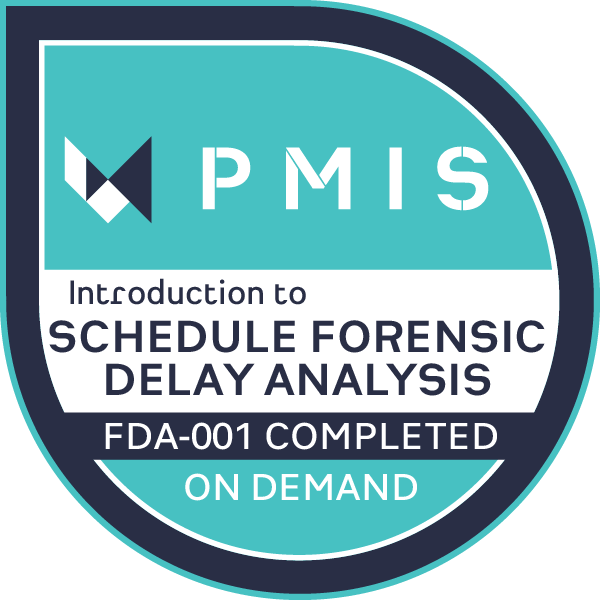
FDA-001: Introduction to Schedule Forensic Delay Analysis
This is a practical hands-on course with no software product used throughout, and provides in-depth training on the principles behind Schedule Forensic Delay Analysis. It commences with the fundamentals of creating a quality CPM Programme and investigates how to interrogate the quality of a Programme against the DCMA 14-Point Schedule assessment and in line with global best practices for planning & scheduling. We will then introduce delay analysis techniques, and discuss their applicability and use. Finally, we will discuss current contractual issues that impact the handling of delays.
We will interrogate sample scenarios and how to review these programmes based against the various methods of delay techniques taught in the class.
This course can be privately run which facilitates a maximum of 9 delegates. If you wish to register your group on this course please contact us.
PREREQUISITE
No prior knowledge required but a basic understanding of Planning & Scheduling is an advantage but not a necessity.
DELEGATE PROFILE
Planners, Schedulers, Quantity Surveyors, Engineers, Project Managers, Contract Managers/Directors, Claims Specialists
TRAINER PROFILE
The course will be delivered by instructors with decades of experience in Contract Management, Planning & Scheduling Forensic Delay Analysis (FDA).
COURSE LENGTH
3-days (09.30am till 4.00pm)
COURSE PRICE
€1925 pp
***Payment must be received in full upon registering in order to secure your place***
Contact us for further information. Please state if you would like a privately run course or wish to attend our public course and list the number of delegates wishing to attend.
Payment must be received in full upon registering in order to secure your place.
LEARNING OUTCOMES
Understand the fundamental principles behind CPM Programmes
Interrogate the quality of a Programme
Have an understanding of the DCMA 14-Point Analysis
Have an understanding of planning & scheduling best practices
Differentiate between the different forms of Delay Analysis
As-Planned Vs As-Built
Impacted As-Planned
Collapsed As-Built
Time Impact Analysis
Windows Analysis
Deliver effective presentations of Delay Analysis
Appreciate how various contract clauses impact Delay Analysis
Differentiate between Mediation, Conciliation, and Arbitration
At the completion of this course the student will be able to:
Understand CPM scheduling techniques
Analyse quality of a Programme
Identify a construed Critical Path
Display schedule delays based on variety of delay methods
Understand requirements based around quality of details for As-Built information
Capture impacts against a Programme in an organised way during the life cycle of the project
Understand Contract requirements in relation to the Programme
COURSE OUTLINE & WORKSHOPS
DAY ONE (Scheduling)
Developing a programme
Impact of Calendars, Holidays, Weather & Contingency on Programmes
Risk Management within your Programme
Analyse & Auditing a Programme
Understanding Responsive Programmes
Frequent Programme Issues
DAY TWO (Delay Analysis)
Managing The Contract Programme
Progress Slippage
SCL Delay & Disruption Protocol
Delay Analysis Methods
Selection of FDA Method
DAY THREE (Contracts)
Introduction to Contracts
Contract Requirements in Relation to Programme
Float Ownership
Identification of the Causes of Delays
Documenting Cause & Effect
What is/is not a compensable Delay for a Contractor
Mediation, Conciliation & Arbitration
WORKSHOPS
Identify Critical Path
Manually calculate Early & Late Dates
Manually create Network diagram
Manually calculate Total Float
Calculate Triple Point Estimate
Identify different delay types
Perform As-Planned vs As-Built analysis
Perform Impacted As-Planned analysis
Perform Collapsed As-Built analysis
Perform Time Impact analysis
Contract Reviews
UPCOMING SCHEDULE FORENSIC TRAINING COURSES
Schedule Forensic Delay Analysis: Introduction and course overview
Forensic Delay Analysis (FDA) can be defined as “the study of event interaction using the critical path method of scheduling to understand the significance of deviations from a baseline for potential use in legal proceedings”. More simply put, FDA is about examining what actually happened on a project, how it differed from the original plan, whose fault it was, what effect it had, and ultimately being able to use this information to back up or contest a claim in court.
Forensic delay analysis, like many other technical fields, is both a science and an art. As such, it relies upon professional judgment and expert opinion and usually requires many subjective decisions. One of the most important of these decisions is what technical approach should be used to measure or quantify delay and identify the affected activities in order to focus on causation (cause and effect). Equally important is how the analyst should apply the chosen method. Professional judgment and expert opinion ultimately rest on subjectivity, but that subjectivity must be based on diligent factual research and objective analysis of the results.
In this course, you will be introduced to many topics that will prepare you to understand forensic delay analysis. A prerequisite to FDA is a thorough understanding of the critical path method of scheduling, so that you can fully understand the impact of schedule deviations. Therefore, we start with a review of CPM, and a discussion of the importance of developing a quality baseline schedule.
We will then examine what constitutes a deviation from the plan, and how we can record progress and identify delays on an updated schedule. This will lead into an in-depth discussion of the various methods of delay analysis, highlighting their advantages and disadvantages. Some general guidelines will be given for choosing the appropriate method for different situations. However, it will ultimately be a decision for your team and you as to which method to use for any particular schedule, based on the evidence to hand and the expertise available to you.
Finally, we will introduce common types of contracts, and discuss contractual requirements with regard to schedule delays and give some presentation of current construction law protocols
It is important to recognize that no forensic delay analysis method is exact. The level of accuracy of the answers produced by each method is a function of the quality of the data used therein, the accuracy of the assumptions, and the subjective judgments made by the forensic schedule analyst. But regardless of method there is one common theme throughout all and that is the importance of a quality schedule and the availability of verifiable records to backup your position.
Course Facilitators
Tony Harkins
Senior Consultant
B.E. (Civil), C.Eng, Eur. Ing. (FEANI), F.I.E.I., F.C.I.Arb. (Chartered Institute of Arbitrators) D.A.L. (Diploma in Arbitration Law) & D.I.A.L. (Diploma in International Arbitration Law), Certificate in European Law, D.L.S. (Diploma in Legal Studies), Dip.E.I.A.Mgt, Dip Mediation Studies
Tony is an expert on Claims Processes (Ireland's 6 public works contracts & RIAI, IEI Forms of Contracts, FIDIC Internationally, NEC3 in the UK and others) and has successfully worked on Delay Analysis Interpretation, Dispute Resolution and the Arbitration - Mediation - Conciliation processes for numerous clients.
Raymond Poole
Managing Director PMIS Ltd.
MSc PPM, M.I.E.I. Dip Eng., Dip A.D.R.
Raymond, the Founding Director of PMIS Ltd and the PM Summit, has been actively engaged within the EPPM sector since 1980, having worked on and led multiple projects in Ireland and overseas and has successfully presented FDA at numerous disputes. He recently qualified with a Master’s degree in Project and Programme Management at The University of Limerick.
“I attended the Intro to Forensic Delay Analysis training run by PMIS. I would highly recommend this course not just for planning personal but also project managers and construction managers as it provides a very good insight into the importance of properly developing the schedule at project commencement and the benefits it would bring in the event of a dispute. Even for someone involved in the planning field for many years, there was still valuable knowledge to be gained. The course was well set out with plenty of 2 way debate and discussion from both attendees and presenters.”
“A PMIS course on Forensic Delay Analysis is a must for Project Schedulers and Quantity Surveyors. Learn how to deal with delays in your schedule early to avoid a protracted disagreement later on. Both contract and schedule covered in this course will compliment seasoned schedulers and direct new schedulers in the right direction.”




